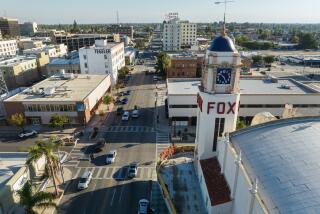State high court backs mall protest
The California Supreme Court ruled Monday that shopping malls cannot stop protesters from urging a public boycott of the stores, even if the demonstrators are on mall property.
The 4-3 decision upholds a 27-year precedent protecting free speech rights at shopping centers, even if the malls are privately owned.
The case started in 1998, when the pressroom union was embroiled in a contract dispute with the San Diego Union-Tribune newspaper. Thirty to 40 union members stood in front of a Robinsons-May store, one of the newspaper’s biggest advertisers, cataloging their grievances and urging customers to contact the chief executive of the newspaper.
Officials at the Fashion Valley Mall in San Diego told the protesters to leave, saying that if they wanted to resume their demonstration, they would have to sign a pledge not to urge a boycott of any store because it would hurt business.
Justice Carlos R. Moreno, writing for the majority, agreed that the mall could regulate protests but said the state’s Constitution barred mall rules for protesters based on the content of their message.
“They may not prohibit certain types of speech based upon its content, such as prohibiting speech that urges a boycott of one or more of the stores in the mall,” Moreno said in the ruling. Chief Justice Ronald M. George and Justices Joyce L. Kennard and Kathryn Mickle Werdegar joined in the decision.
In dissent, Justice Ming W. Chin protested that the court was treating private property as a “public free speech zone.”
“A shopping center exists for the individual businesses on the premises to do business,” he wrote. “Urging a boycott of those businesses contradicts the very purpose of the shopping center’s existence.” Chin’s opinion was joined by Justices Marvin R. Baxter and Carol A. Corrigan.
“The only tradition that is relevant to this case is the tradition followed in most of the country, of finding no free speech rights on private property,” Chin wrote.
“The majority is trampling on tradition, not following it,” he added.
Eugene Volokh, a constitutional law professor at UCLA, said California and a few other states back free speech at large malls on the theory that they function as modern-day town squares.
“That’s where people congregate these days, and that’s where it’s important that free speech be protected,” he said.
Thomas Leanse, a lawyer who argued the case on behalf of the International Council of Shopping Centers and the California Business Properties Assn., called the ruling “incremental,” saying it affects only boycott campaigns and otherwise affirms the mall’s right to enforce its rules.
Volokh said the case raises a question whether the state high court intends to protect all mall demonstrations, even those infused with religious or racial bias.
More to Read
Start your day right
Sign up for Essential California for news, features and recommendations from the L.A. Times and beyond in your inbox six days a week.
You may occasionally receive promotional content from the Los Angeles Times.






